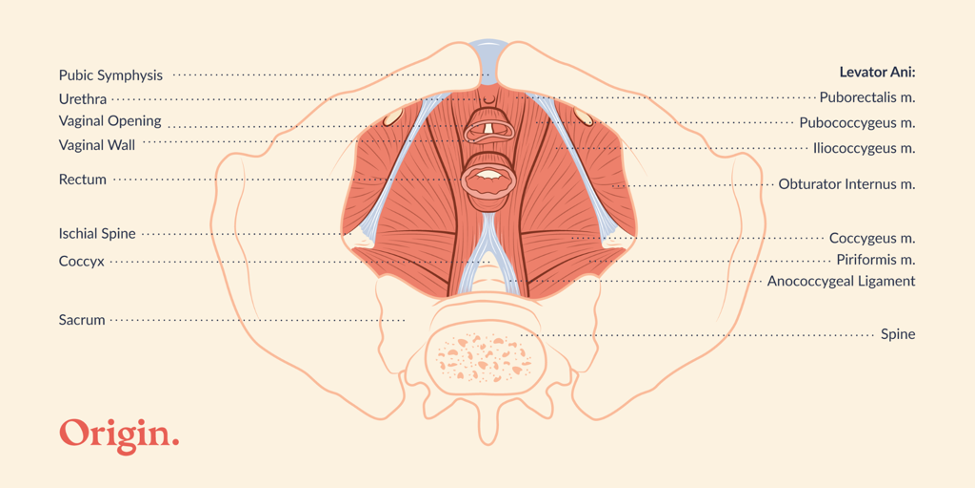With all of the knowledge, self-awareness, and confidence that we gain as we age “about ourselves, our bodies, our turn ons and turn offs “ sex after 50 can be some the best sex of our lives. I know that can be hard to believe. We’ve all heard the negative messaging around menopause as the period of time when we lose our libido as well as our physical ability to enjoy sex. As a physical therapist who helps patients maintain their pelvic health, at every stage of life, I can tell you that it doesn’t have to be true for you.
Yes, menopause brings about significant changes as your ovaries stop producing estrogen. But, by focusing on your pelvic health, you can not only prevent and improve pelvic floor issues that put a damper on sex, you can also connect with your body in new and pleasurable ways.
Low Estrogen & Sexual Functioning
Several menopause-related changes can impact the way your body feels and functions during sex. As estrogen levels decrease, blood flow to the tissues of the vulva decreases, which can affect the size of the clitoris and its sensitivity to stimulation. The tissue of the vagina can become thinner and less flexible, and you may produce less natural lubrication which can lead to pain during sex. The same dryness that affects the tissues of the vagina can also affect the tissues in your mouth, which can make oral sex and even kissing a challenge.
These changes also tend to coincide with age-related muscle and sensory shifts, which can pose even more challenges to maintaining and enhancing one’s sex life. For many people, weakness in the muscles that surround the vagina, bladder and bowel can lead to urinary leakage, constipation, sexual dysfunction and pelvic organ prolapse. All of these things can contribute to how we feel about, and how we experience sex.
But changes in your body are nothing new. Through every menstrual cycle since puberty, your body has changed. If you were ever pregnant, your body has changed. If you’ve dealt with major illnesses or injuries, your body has changed. This is not to say that going through menopause is easy or to minimize the impact that these changes can have on your life, but you’ve experienced major physical changes before “ and both you and your body are incredibly resilient.
There’s clear evidence showing that addressing pelvic floor muscle function, in conjunction with improving overall muscle strength and physical wellbeing, can help to reduce and even prevent many of these symptoms related to menopause. Which brings me to the power of your pelvic floor.
Tap into the Power of Your Pelvic Floor
The pelvic floor refers to the multi-tasking group of muscles and connective tissues that make up the bottom of the pelvis. These muscles run from your pubic bone to your tailbone and wrap around the vaginal and anal openings. They also support and bring blood flow to the clitoris, vulva, and vaginal walls; and they are critical to maintaining and elevating your sexual function!
It’s important to keep all of your muscles strong and healthy as we age, and the pelvic floor muscles are no exception. During penetrative sex, the muscles that wrap around the anal and vaginal entrances, lengthen and open for pain free penetration and stretch, but they can also be squeezed for increased friction and sensation. Your pelvic floor is also important in orgasm with research showing that, during orgasm, the pelvic floor muscles will actually contract involuntarily.

Strong, healthy muscles have better blood flow, and during arousal, your pelvic floor helps to prepare your genitals for sex by bringing blood flow into your tissues, helping with tissue engorgement, and increasing nervous system activity and sensitivity in all of your pelvic erogenous zones (your clitoris, labia, vagina, anus, cervix, and lower abdominals for example).
This is why one of the most physically important things you can do for your sex life is maintain your pelvic floor health. If you are unsure of where to start, try these tips below.
Make sex a habit. The “use it or lose it” principle is particularly important after menopause. While it’s not uncommon for sex frequency to slow down, it’s important to consider that if you aren’t having sex, or if it’s less frequent, the vagina may begin to narrow with less flexibility and increased atrophy of the tissues, which can lead to more pain and dysfunction during penetrative intercourse. If partnered sex isn’t an option or isn’t something that interests you, this is a great time for solo sex. Masturbation with a penetrative sex toy can be a great way to encourage blood flow to your vulvovaginal tissues.
Explore different kinds of touch. You may also choose to focus on outercourse, if your vaginal tissues feel pain during penetration. As your nervous system, and tissues of the pelvic floor change, what may have felt pleasurable before could start to feel irritating and unwanted. By focusing on touch and sexual activity that is pain free and pleasurable for you now, you can avoid taking part in the pain cycle that so commonly surfaces in menopause. Consider reaching out to a sex counselor, if you are looking for further guidance on how to explore different kinds of sex.
Maximize your pelvic floor muscle health. Even as we age, research shows that people who are sexually active and able to achieve orgasm tend to have healthier pelvic floor muscles. Since healthy pelvic floor muscles can encourage blood flow to where you need it most, you may consider learning strategies to improve your pelvic floor health, such as strengthening your pelvic floor or increasing the pain free flexibility of those muscles by using dilators or beginning a stretching program to address overactive and irritable muscles. It may even mean working on your ability to properly coordinate these muscles during sex.
To learn more about your pelvic floor and how it can improve your sex life, ask your gynecologist or primary care physician for a referral to a pelvic floor physical therapist. Your therapist will evaluate your pelvic floor muscle functioning and create a personalized treatment plan to address and prevent symptoms “ and help you feel good in your body right now, which may be the biggest sexual turn on of all.
Celestine Compton, PT, DPT is a doctor of physical therapy at Origin with a board-certified specialization in women’s and pelvic health. She continues to expand her knowledge and capabilities within the field of women’s health PT to provide her patients and community with the best care, advocate for her profession on local and national levels, and support the advancement of women’s health through contributions to research, public awareness, and education. As part of the Origin team, she hopes to do her part to raise the standard of care that all women receive at every stage of life and to improve patient access to quality care so that no individual, regardless of location, race, identity, education, sexuality, or economic status is left behind.
The information on the Gennev site is never meant to replace the care of a qualified medical professional. Hormonal shifts throughout menopause can prompt a lot of changes in your body, and simply assuming something is “just menopause” can leave you vulnerable to other possible causes. Always consult with your physician or schedule an appointment with one of Gennev’s telemedicine doctors before beginning any new treatment or therapy.
“
“
